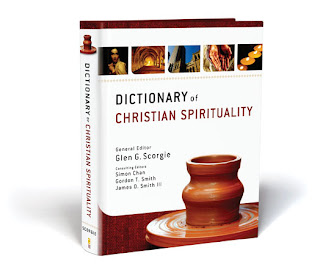EDITED: Glen G. Scorgie, Simon Chan, Gordon T. Smith, James D. Smith III.
PUBLISHER: Grand Rapids, MI: Zondervan, 2011, (864 pages).
This is another addition to a bludgeoning potpourri of dictionaries on Christian spirituality. The general reader may wonder why. Safe to say, in an increasingly 'spiritual-but-not-religious' climate of anti-institutional, anti-high-church, anti-religious, and anti-establishment, people are gravitating toward embracing an alternative to this broken world. Even secularists will find it tough to dismiss the benefits of spirituality altogether, as long as it is not 'religious.' This volume distinguishes itself by being scholarly plus practical, informative plus illuminating, historical plus relevant to present day life, diverse yet united by a common cause.
"In summary, authentic Christian spirituality (or the Christian life, which is the same thing) is a Spirit-enabled relationship with the triune God that results in openness to others, healing progress toward Christlikeness, and willing participation in God's purposes in the world." (Glen Scogie)
The common themes are described in three movements: relational, transformational and vocational, and three dynamics: Christ with us, Christ in us, and Christ working through us.
The statistics are impressive. One volume, one general editor, three consulting editors, over four years, traversing several continents, and hundreds of contributors from all over the world. The articles give a very succinct summary on the nuances of the various aspects of Christian Spirituality. What makes it very readable is the conscious decision to avoid flooding the article with excessive footnotes, typical of a scholastic manual. Instead, using non-intrusive italics, brackets, and suitably placed references for additional research, one finds the book very readable. Each time you open up the dictionary, there is always something new to learn. The ecumenical approach will appeal to many different traditions. The historical approach gives readers a clear understanding of the past, and opens up creative ways to imagine its applications in the present. The interdisciplinary stance weaves in theology, philosophy, epistemology, missions, mysticism, monasticism, psychology, modern science, plus many Christian spiritual disciplines familiar to popular evangelical culture. In fact, the book dishes out much more than conventional Christian spirituality, engaging changing contexts and modern cultures in a way that is modern, relevant, yet grounded in history.
Part One comprises of 34 integrative essays on key thrusts of Christian spirituality. Part Two packs in nearly 700 short entries on terms related to Christian spirituality. While Gordon Wakefield's and Philip Sheldrake's dictionary versions is from a Protestant perspective, and Michael Downey's from a Catholic point of view, this volume seeks to be ecumenical, combining the best of scholarship, popular writing, practitioners, and many more. The purpose of the dictionary is to provide an update on the field of Christian spirituality, be 'biblically engaged,' practical and assessible, covering a wide range of traditions, putting focus on neglected forms of spirituality, global reach, interdisciplinary, and at an affordable price point.
"Christian spirituality is the domain of lived Christian experience. It is about living all of life - not just some esoteric portion of it - before God, through Christ, in the transforming and empowering presence of the Holy Spirit. And precisely because this lived experience of the Christian is the existential heart of the faith, its careful examination and nurture are vitally important." (Glen Scorgie, 27)For an 'inside scoop' on how the book is birthed, go to Glen Scorgie's website here.
My Comments
This volume is a joy to read, especially for students of Christian spirituality. Beginning with an affirmation of evangelical beliefs, it embraces other traditions that enriches the study of spirituality. The integrated perspectives cover the Old and New Testaments, on each member of the Triune Godhead, a history of more than 2000 years of Church history, Christian Education, Spiritual Formation, Eschatology, and many more. From the ancient teachings of Augustine and Plato, to the Medieval mystics; from the Protestant beginnings to popular culture, from the present to a glimpse of how the future looks like, this book is a delight to behold. The short articles are indeed brief, supported by an equally brief list of references for further research.
As a dictionary, I strongly recommend buying a hard copy instead of the ebook version. This review is based on a physical hard copy that I borrowed from the library. The initial ebook version that I received is way too difficult to read. Other than this minor hiccup, I have lots of fun just breezing through the works of the many professors I have come to known personally from my seminary days.
Ratings: 5 stars of 5. (for the hardcover version)
conrade
The ebook version of this book has been supplied to me free by Zondervan and NetGalley without any obligation for a positive review. The comments made above are freely mine.

No comments:
Post a Comment